2012-13
Brett Snider, Renewable Energy Intern 2012 - 2013
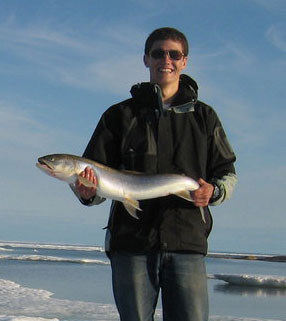 Background Bio:
Background Bio:
My interest in the developing areas of the world began early in my childhood as I listened to my Dad’s stories of working in Nigeria as a CUSO volunteer in the early 70’s. As I grew up I became interested in the environmental issues that were affecting these developing countries and decided that my undergraduate education must attempt to address some of these concerns. I decided to attend the University of Guelph to study environmental engineering where we focused on pollution affecting soil, water and air. In my second last semester I went on an exchange to La Trobe University in Australia to study sustainable engineering. This exchange focused on how the global problems we are facing today must be solved with sustainability in mind.
Over the summer breaks at university I worked in the Canadian Arctic cleaning up soil and water contamination at old military sites. At this job we lived in remote camps of 40-60 people where I was considered part of a minority (the majority of the workers were Inuit). This job not only taught me the technical information needed to deal with ground and water pollution but also the insight on working with a unique culture and environment.
I have recently graduated from the University of Guelph (April, 2012) and I am extremely excited to start my internship with REAP Canada. As a renewable energy intern I will be working with efficient cookstoves that will help decrease deforestation, household air pollutants, and increase the living conditions for women and children in these communities. I cannot wait to start my work in The Gambia and learn how to improve and introduce these cookstoves in a completely different culture and environment.
Education:
B.Eng. – Environmental Engineering, University of GuelphHost Country:
The Gambia
Internship Experience:
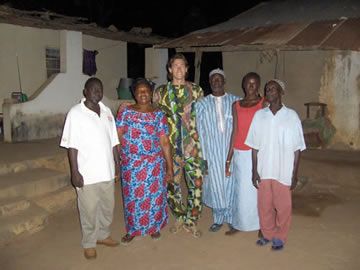 I have recently returned from the Gambia and this is a good time to reflect on my experience there. Working and living in West Africa for 7 months is not a common opportunity and it is certainly something I will remember for my life time.
I have recently returned from the Gambia and this is a good time to reflect on my experience there. Working and living in West Africa for 7 months is not a common opportunity and it is certainly something I will remember for my life time.
While in the Gambia, my work focused on finishing the CLEAR project – which involved implementing two types of cook stoves, the MTS and Noflay. The Noflay stove (a clay brick stove) had a few issues with proper construction and durability. I worked closely with masons on trying to find solutions to these problems. Most of the issues were fixed simply through mason education (adjusting the lime mixture, using more cement, etc.) and introduction of jigs to standardize important measurements on the stove (door size, secondary air holes, and pot skirt gap) which helped facilitate complete combustion.
The MTS stove was a metal stove that was constructed in workshops and had a different set of problems. The tracking of stoves built and the method of distribution required adjustments. In working with the workshop employees, material suppliers, and truck drivers we were able to increase productivity of the MTS. With these few adjustments we were able to introduce improved cook stoves to numerous villages throughout the Gambia. It was extremely satisfying seeing families save money on fuel, reduce deforestation, and women and children noticing an improvement in their health through reduction of indoor air pollutants by using these cleaner burning stoves.
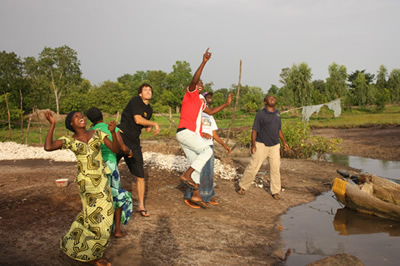
I believe my expertise and hard work has had a beneficial impact on the people I have worked with in The Gambia but it is difficult to see a long term change within 6 months. However, the impact my experience has had on me is very clear. My time in the Gambia has taught me how to better delegate tasks, communicate clearly, and given me a unique set of problems solving skills (when having transportation issues, never rule out a donkey cart!). The largest change I have noticed has not been with my work skills but in my own behavior. Working and living with Gambians it is impossible not to notice there generosity. When over 60% of a family’s income is spent on food and they still offer it to strangers walking by their compounds, your view on charity quickly changes. Besides their generosity, other life skills I have learned include patience (whether brewing attaya or waiting for meetings to start), and being more social with everyone – even strangers.
Of course, working in a place like the Gambia isn’t always easy. But looking back on my internship now, I can honestly say I would not have traded this experience for anything.
Adama Sow, Renewable Energy Intern 2012 - 2013
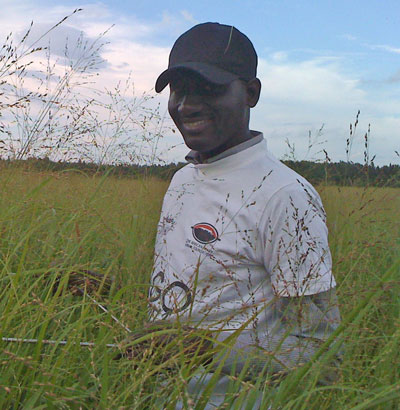
Mon intérêt pour le développement s’est toujours traduit par des actions concrètes au bénéfice des communautés que j’ai rencontrées dans le cadre de mon développement pédagogique ou professionnel.
Dans mon village au nord du Sénégal, sous mon impulsion, les résidents organisent annuellement depuis 2001 les « 48 h de Dioudé Diabé». Cet événement de deux jours de festivités, placé sous le signe du développement durable marque la fin de deux mois cours gratuits administrés aux élèves du village et des environs pendant les vacances scolaires. Un programme d’actions et de réflexions sur les domaines de l’éducation, de la sante, de l’environnement, du sport et de la culture ainsi que la valorisation du potentiel agro-énergétique permet aux résidents de Dioudé d’agir pour le progrès de cette zone.
Ma mission de président du bureau des élèves de l’École Supérieure Polytechnique de Thiès (Sénégal) en 2006 m’a permis de porter le mémorandum pour arriver à des solutions tangibles dans l’amélioration des conditions socio-pédagogique des élèves.
En France, après ma spécialisation en stratégies énergétiques, j’ai travaille avec l’Institut Polytechnique de Toulouse sur la « Mise en place d’un système de pompage au solaire en Afrique : catalogue de solutions ». Sur cette lancée, avec deux amis (camerounais et franco-haïtien), nous avons créé l’Association des Volontaires du Développement Durable (AVD) le 11 janvier 2010 à Paris.
Au Québec, ma mission d’administrateur en 2012 à l’ONG Ingénieurs Sans Frontières Québec m’a permis de suivre des projets innovants pour le développement des communautés du Sud.
En tant que stagiaire énergies renouvelables de REAP Canada au Sénégal, je vais travailler sur des foyers améliorés afin d’avoir une baisse de la déforestation et de la pollution atmosphérique, et une augmentation des conditions de vie des femmes et des enfants dans ces communautés. Je participerai aussi à l’implantation du projet The Agro-Ecological Village.
Au Canada, je travaille dans la recherche et le développement sur la biomasse produite à partir du panic érigé.
Education:
Ingénieur spécialisé en stratégies énergétiquesHost Country:
The Sénégal
Nilmi Senaratna, Ecological Agriculture Intern 2012-2013
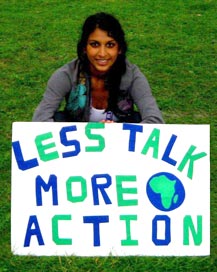 Growing up in the small farming community of Strathroy, Ontario in a family that loved to travel, I was motivated at a young age to work abroad. After completing my Undergraduate degree in Environmental Science at Western University (WU), I knew that I enjoyed exploring environmental issues as well. Putting both my passions into practice, I pursued a career in International Development with a focus on environmental issues.
Growing up in the small farming community of Strathroy, Ontario in a family that loved to travel, I was motivated at a young age to work abroad. After completing my Undergraduate degree in Environmental Science at Western University (WU), I knew that I enjoyed exploring environmental issues as well. Putting both my passions into practice, I pursued a career in International Development with a focus on environmental issues.
In 2009, I worked with Western Heads East, a Non-Governmental Organization, as a researcher in Kigali, Rwanda and Mwanza, Tanzania. The project aimed to work with local women's group to make and sell probiotic yogurt that showed improvements in the health of people living with HIV/AIDs. I was able to learn how to implement environmental initiatives into small business, empower women, and improve community health in a sustainable way.
This same year, I gained another unique international experience in Sri Lanka. This included surveying a site for the implementation of a hydropower plant in the Kanneliya rainforest which allowed me to understand renewable energy resources and their implementation abroad.
Finally, to complete my Masters degree in Environment and Sustainability at WU, I worked as a Junior Environment Specialist at the Headquarters of the Canadian International Development Agency (CIDA) where I learned about community-based natural resources management, climate change and agricultural practices in developing countries at the policy level.
After completing my education, I knew I was not done working in the field and that was when I came across the internships offered by REAP-Canada. I love to meet new people, try new food, work in challenging environments and immerse myself in new cultures and I knew that this was the perfect opportunity for me. I am so excited and fortunate to be involved with REAP-Canada at a professional level where all my interests come together into one amazing development project. I look forward to travelling to Senegal as an Ecological Agriculture Intern!
Education:
B.Sc. – Environmental Science, Western University CanadaMES – Masters in Environment and Sustainability, Western University Canada
Host Country:
The Sénégal
Internship Experience:
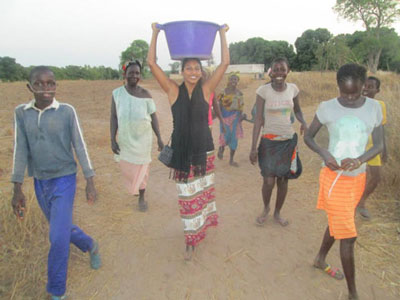 My internship with REAP-Canada was based out of a small village called Wack N'gouna. On my way to the village from Dakar, I remember passing the Baobab trees and donkey-carts and people walking around with buckets on their heads and thinking: "What have I gotten myself into." I remember thinking in a slight panic..."I really hope this bus stops soon!"
My internship with REAP-Canada was based out of a small village called Wack N'gouna. On my way to the village from Dakar, I remember passing the Baobab trees and donkey-carts and people walking around with buckets on their heads and thinking: "What have I gotten myself into." I remember thinking in a slight panic..."I really hope this bus stops soon!"
Nothing would have prepared me for what I stumbled upon next. A village experience is something that you cannot prepare for. I remember arriving in my small, hut-like compound and crying, feeling alone and scared for the 7 months ahead. I did not think I would survive the experience.
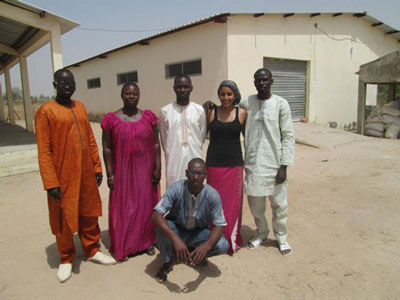 Though, as the time passed from what I thought was a barren and boring place, emerged an incredible sense of community that I have never experienced before in my life. What we assume as Africa (poverty, lack of healthcare, limited diet), I never saw. All I felt was love, joy, acceptance, generosity and happiness from the families that took me in, fed me and gave me their beds to sleep on. In Senegal there exists the word "Teranga", which you cannot really explain in English. It is just how the people are. They are open, friendly and so curious to spend time with you. You will never pass someone without them asking where you are from, and you will never pass by a family surrounding a bowl of food without someone calling out, "come eat with us!" You will never walk anywhere alone, because perfect strangers will stop what they are doing and walk you there to make sure you arrive safely. They wil give you the shirt on their back - even if it is the only one they own. I cannot explain the generosity of the people in words. It is extraordinary, and it bring up a feeling in us as visitors that is inexplicable. You feel completely accepted as family, even by strangers. That is what we call "Le Teranga Senegalais."
Though, as the time passed from what I thought was a barren and boring place, emerged an incredible sense of community that I have never experienced before in my life. What we assume as Africa (poverty, lack of healthcare, limited diet), I never saw. All I felt was love, joy, acceptance, generosity and happiness from the families that took me in, fed me and gave me their beds to sleep on. In Senegal there exists the word "Teranga", which you cannot really explain in English. It is just how the people are. They are open, friendly and so curious to spend time with you. You will never pass someone without them asking where you are from, and you will never pass by a family surrounding a bowl of food without someone calling out, "come eat with us!" You will never walk anywhere alone, because perfect strangers will stop what they are doing and walk you there to make sure you arrive safely. They wil give you the shirt on their back - even if it is the only one they own. I cannot explain the generosity of the people in words. It is extraordinary, and it bring up a feeling in us as visitors that is inexplicable. You feel completely accepted as family, even by strangers. That is what we call "Le Teranga Senegalais."
The best summation of my feelings in Senegal came to me as I was heading home. I cried. This time, not from the loneliness and the fear of what layed ahead, but from the idea that I would leave my friends, my families and the community that had come together to change my life. I owe a lot of personal accomplishments to my internship in Senegal, I learned to be independant, to rough it in travel, to trust and to integrate into a beautiful culture that I now call part of my own. Dieuredieuf Wack N'gouna, ba beneen yon, in sha Allah!
Nick Choy, Sustainable Agriculture Intern 2012-2013
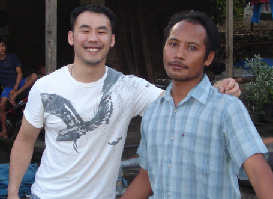 Background Bio: Born in Malaysia, my family immigrated to Vancouver in 1989 where I grew up. Most of my professional experience has been delivering financial services to new immigrants and business services to small enterprises. Working with multi-disciplinary teams for the 2011 International Student Energy Summit sparked an interest in renewable energy which complemented my studies in Agriculture and Resource Economics. Combining my work history, academic training and community activities I decided to explore a career in international development.
Background Bio: Born in Malaysia, my family immigrated to Vancouver in 1989 where I grew up. Most of my professional experience has been delivering financial services to new immigrants and business services to small enterprises. Working with multi-disciplinary teams for the 2011 International Student Energy Summit sparked an interest in renewable energy which complemented my studies in Agriculture and Resource Economics. Combining my work history, academic training and community activities I decided to explore a career in international development.
I helped to develop sustainable biomass supply chains to combat deforestation in Indonesia for my 2012 graduating project. The opportunity to interact with diverse stakeholders linked by shared concerns exposed me to the rewards and frustrations of fieldwork. The challenges I faced helped to identify many skills I need to develop to advance my personal growth. Working in the Gambia with REAP will hopefully help increase my effectiveness and contributions to the field of international development by building on these lessons.
Education:
Master of Food and Resource Economics; B.A. (Economics and Asian Studies) – University of British Columbia.Host Country:
The Gambia
Internship Experience:
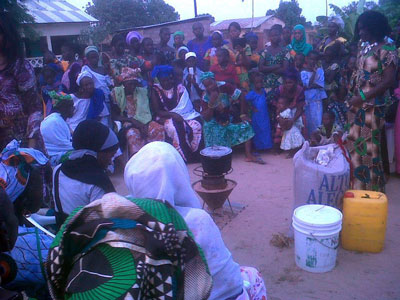 As a new entrant into the field of international development, one of my personal objectives for this internship was to learn. I wanted to gain a better understanding about the industry and also the meaning behind “assisting” the Global South. At first I thought my lack of formal training in development placed me at a disadvantage. A week before my departure I was exposed to some of the history behind the field and was slightly disillusioned. An economist by training, many of my peers seek jobs at the World Bank, the IMF and the ADB. I regard the efforts by individuals at these institutions with no less admiration than before. But I have gained new insight which enhances my ability to critically analyze interventions. Above all, I walk away without a doubt that REAP pursues the altruistic ideals which drew me to industry in the first place. I returned home with a sense of accomplishment and fulfillment as, on my last day, Roger Samson paid me the following compliments: He was surprised at how versatile my skills were and that I “get” the development side more than most.
As a new entrant into the field of international development, one of my personal objectives for this internship was to learn. I wanted to gain a better understanding about the industry and also the meaning behind “assisting” the Global South. At first I thought my lack of formal training in development placed me at a disadvantage. A week before my departure I was exposed to some of the history behind the field and was slightly disillusioned. An economist by training, many of my peers seek jobs at the World Bank, the IMF and the ADB. I regard the efforts by individuals at these institutions with no less admiration than before. But I have gained new insight which enhances my ability to critically analyze interventions. Above all, I walk away without a doubt that REAP pursues the altruistic ideals which drew me to industry in the first place. I returned home with a sense of accomplishment and fulfillment as, on my last day, Roger Samson paid me the following compliments: He was surprised at how versatile my skills were and that I “get” the development side more than most.
Contributing to Impact
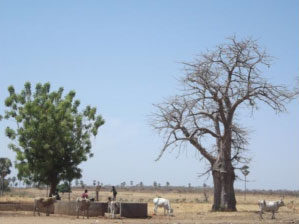 Many of us seek meaning from our work and I think many of those who pursue careers in development do not make the choice for the signing bonuses. This begs the question, “How much impact can I have in 6 months?” Many of my fellow Green Reapers can probably share stories of the challenges behind marketing the MTS in Gambia. Roger and Meredith hired me largely to serve this purpose. Moreover, I had the exciting opportunity to be the first intern placed with a new local partner, AVISU, to implement the new SAEV project in the Central River Region (CRR). Essentially, serving the function of interim Marketing Manager, one of my largest contributions was to clear out 90% of the remaining MTS inventory in the Combos. This was accomplished by forging a new partnership with Women’s Initiative the Gambia (WIG), a fledgling women’s empowerment CBO. Their solar fruit drying project had been phased out for a number of reasons. While conducting a feasibility study and MTS demonstration in one of their peri-urban project sites, it came to light that erratic rainfall patterns prohibited solar drying for the majority of the mango season. Thus, I proposed to launch a value-added processing enterprise featuring the MTS. This income generating opportunity could offset capital costs, serve as a climate change adaptation and, as the MTS utilizes agricultural residues, a climate change mitigation strategy. According to the literature, one of the drawbacks of improved cook stove programs is that women lose social time they spend gathering wood. As the MTS provides a portable cooking solution, women can now bring their stoves together and collaborate in making mango jam. Time previously spent trudging long distances to collect fuelwood can now be applied more productively. Also, combining MTS demonstrations with mango jam making workshops meets multiple project activity targets in a single session, thereby reducing budget outlays. The picture above shows the Gambian director of WIG, Isatou Ceesay, imparting the knowledge and skills that originated with REAP’s Agro-Ecological Village training modules. I will always treasure memories of smiling women and children at the end of each demonstration saying, “It tastes like honey. Thank you!”
Many of us seek meaning from our work and I think many of those who pursue careers in development do not make the choice for the signing bonuses. This begs the question, “How much impact can I have in 6 months?” Many of my fellow Green Reapers can probably share stories of the challenges behind marketing the MTS in Gambia. Roger and Meredith hired me largely to serve this purpose. Moreover, I had the exciting opportunity to be the first intern placed with a new local partner, AVISU, to implement the new SAEV project in the Central River Region (CRR). Essentially, serving the function of interim Marketing Manager, one of my largest contributions was to clear out 90% of the remaining MTS inventory in the Combos. This was accomplished by forging a new partnership with Women’s Initiative the Gambia (WIG), a fledgling women’s empowerment CBO. Their solar fruit drying project had been phased out for a number of reasons. While conducting a feasibility study and MTS demonstration in one of their peri-urban project sites, it came to light that erratic rainfall patterns prohibited solar drying for the majority of the mango season. Thus, I proposed to launch a value-added processing enterprise featuring the MTS. This income generating opportunity could offset capital costs, serve as a climate change adaptation and, as the MTS utilizes agricultural residues, a climate change mitigation strategy. According to the literature, one of the drawbacks of improved cook stove programs is that women lose social time they spend gathering wood. As the MTS provides a portable cooking solution, women can now bring their stoves together and collaborate in making mango jam. Time previously spent trudging long distances to collect fuelwood can now be applied more productively. Also, combining MTS demonstrations with mango jam making workshops meets multiple project activity targets in a single session, thereby reducing budget outlays. The picture above shows the Gambian director of WIG, Isatou Ceesay, imparting the knowledge and skills that originated with REAP’s Agro-Ecological Village training modules. I will always treasure memories of smiling women and children at the end of each demonstration saying, “It tastes like honey. Thank you!”
Meeting Needs
“Is there a need for our product or service?” This is one of the key questions businesses explore during feasibility studies. After spending 6 months in the Gambia, living amongst beneficiaries in their villages, and learning about REAP’s AEV model, I can say “Yes.” Our Seed Improvement program, adaptability trials and learning farms represent critical tools to enhance the livelihoods of subsistence farmers in CRR. While I regret not being able to directly observe improvements in food security, agricultural production and environmental conditions, the potential is there and our beneficiaries want it. Compared to other regions, the soil and micro-climatic conditions in CRR are arguably amongst the most challenging to work with in the Gambia. But the SAEV project’s field staff are motivated and determined. Thus, the stage for improvement in growth is set. The bonds I built with our Community Organizers, as I lived and worked with them, coupled with the reception we were given by villages as they accepted us into their lives supports this hope.
Growth
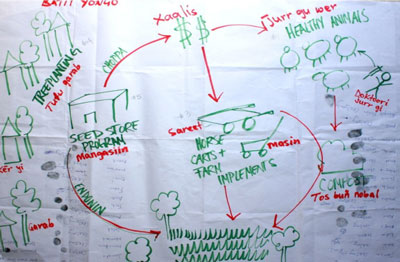 Upon returning one of the most common questions people ask me is, “How did Africa change you?” I think they expect me to talk about the harsh living conditions and how I appreciate the advantages we enjoy. While this is true, I feel the major driving force behind my personal growth are the lessons I learned building interpersonal, cross-cultural communications skills. My work history in business created many opportunities to solve problems by bridging or negotiating competing stakeholder interests. Learning to apply these skills in an international development context has definitely expanded the breadth and depth of my competencies. Particularly, CIDA’s bottom-up, participatory approach to project implementation resonates with the “customer first” service orientation I was trained in. However transforming ideology into practice can often spark, sometimes painful, learning experiences. Thanks to support and guidance from REAP’s executive team, the Community Organizers’ enthusiasm, and the earnest appreciation of the communities, I was constantly reminded of my purpose: to learn and strive towards helping those at the base of the pyramid. The pictoral depiction (above) of solutions to agro-ecological challenges from a problem-tree analysis generated by a SAEV project community examplifies this. Despite seemingly insurmountable obstacles left in the wake of historically myopic decision making, we can catalyze change through patience, dilligence, collaboration and shared learning.
Upon returning one of the most common questions people ask me is, “How did Africa change you?” I think they expect me to talk about the harsh living conditions and how I appreciate the advantages we enjoy. While this is true, I feel the major driving force behind my personal growth are the lessons I learned building interpersonal, cross-cultural communications skills. My work history in business created many opportunities to solve problems by bridging or negotiating competing stakeholder interests. Learning to apply these skills in an international development context has definitely expanded the breadth and depth of my competencies. Particularly, CIDA’s bottom-up, participatory approach to project implementation resonates with the “customer first” service orientation I was trained in. However transforming ideology into practice can often spark, sometimes painful, learning experiences. Thanks to support and guidance from REAP’s executive team, the Community Organizers’ enthusiasm, and the earnest appreciation of the communities, I was constantly reminded of my purpose: to learn and strive towards helping those at the base of the pyramid. The pictoral depiction (above) of solutions to agro-ecological challenges from a problem-tree analysis generated by a SAEV project community examplifies this. Despite seemingly insurmountable obstacles left in the wake of historically myopic decision making, we can catalyze change through patience, dilligence, collaboration and shared learning.
Rebecca Chin, Renewable Energy Intern 2012-2013
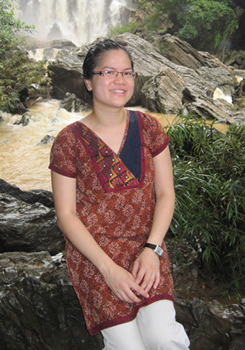 I have always been inclined to solving problems. My strengths in math and sciences are one such example which led me to study Bioresource Engineering. I started off wanting to address environmental problems like waste management, but was exposed to how Bioresource Engineers can help to address problems in International Development. I saw the impact through upper year students’ projects such as rice parboiling which improves its nutritional value and storage properties. Later, my first concrete eye-opening experience relating to poverty in a developing country was in the Dominican Republic where I saw a family with a fruit stall on the roadside—on a deserted road. This disconnect made me wonder about international development and how I could get involved.
I have always been inclined to solving problems. My strengths in math and sciences are one such example which led me to study Bioresource Engineering. I started off wanting to address environmental problems like waste management, but was exposed to how Bioresource Engineers can help to address problems in International Development. I saw the impact through upper year students’ projects such as rice parboiling which improves its nutritional value and storage properties. Later, my first concrete eye-opening experience relating to poverty in a developing country was in the Dominican Republic where I saw a family with a fruit stall on the roadside—on a deserted road. This disconnect made me wonder about international development and how I could get involved.
Consequently, I added an International Development Studies Minor and attended several of the McGill Global Food Security Conferences in order to gain a better understanding of some of the issues. I also wanted to get some experience abroad to get a taste of this type of work. I was fortunate to be able to go to Dharwad, Karnataka, India in the summer of 2012 for an internship where I optimized a rubber roller mill for millet processing. Learning about the nutritional importance of millet, and its past and present use in India gave me an introduction to how food insecurity could be addressed. I was able to see first-hand how development projects work.
I look forward to gaining more experience in the realm of international development during my internship as a Renewable Energy Intern!
Education:
B. Eng. Bioresource Engineering, Minor in International Development Studies, McGill UniversityHost Country:
The Sénégal
Internship Experience:
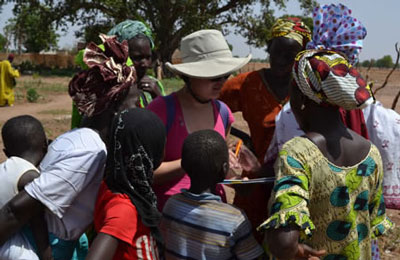 Senegal was the first African country that I visited. My ideas of Africa were a result of a combination of influences from mass media—the Lion King and charity/NGO infomercials—which is to say that I didn’t have a real idea of what to expect. Fortunately, I was pleasantly surprised with what I found. At first, the adjustments were quite something to handle: the dry, unrelenting heat which led me to get sick, the new foods (lots of fish and onions!) and being a total stranger to the local language (Wolof). Luckily, with time and effort, life in Wack Ngouna started to come together. Senegal is known as the country of “teranga”— of hospitality— and I definitely felt it! Living with 10 strangers didn’t really feel weird- as of the first day, my compound-mates were trying to teach me some local words, helping my integration into local village life.
Senegal was the first African country that I visited. My ideas of Africa were a result of a combination of influences from mass media—the Lion King and charity/NGO infomercials—which is to say that I didn’t have a real idea of what to expect. Fortunately, I was pleasantly surprised with what I found. At first, the adjustments were quite something to handle: the dry, unrelenting heat which led me to get sick, the new foods (lots of fish and onions!) and being a total stranger to the local language (Wolof). Luckily, with time and effort, life in Wack Ngouna started to come together. Senegal is known as the country of “teranga”— of hospitality— and I definitely felt it! Living with 10 strangers didn’t really feel weird- as of the first day, my compound-mates were trying to teach me some local words, helping my integration into local village life.
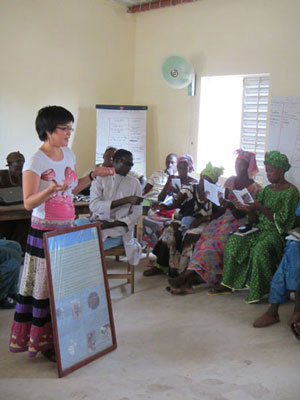 My internship was primarily focused on improving the quality of the REAP Clay Brick Stove, locally known as the “Noflay” or “no problem” stove, at the Cadre Local de Concertation des Organisations de Producteurs (CLCOP) – Wack Ngouna. I was tasked with finding higher quality clays that could better withstand the high cooking temperatures and hold the weight of the full cooking pots. A typical week consisted of visiting three different villages to collect clay samples, preparing the clay mixture (clay and lime, and cooked and non-cooked clay mixtures), making bricks, allowing them to dry, preparing the mortar and building the stove. Getting to the field sites was not a simple task- transportation was often difficult and frequent visits to top up on the required amount of clay were necessary. Despite the challenges, four test stoves have been built, each of different clay brick and/or mortar compositions, and are being monitored for their quality. So far, cooked clay samples have turned a reddish colour which had been a desired objective for the past year indicating that a reliable source of clay has finally been found, and the stove quality seems improved due to the stronger clay bricks. Overall, I have received positive feedback from users about the REAP Clay Brick Stove: women have told me that they use very little wood as compared to the traditional three-stone fire, that there is less smoke and consequently better health and comfort while cooking. I have enjoyed working with the local partner organization.
My internship was primarily focused on improving the quality of the REAP Clay Brick Stove, locally known as the “Noflay” or “no problem” stove, at the Cadre Local de Concertation des Organisations de Producteurs (CLCOP) – Wack Ngouna. I was tasked with finding higher quality clays that could better withstand the high cooking temperatures and hold the weight of the full cooking pots. A typical week consisted of visiting three different villages to collect clay samples, preparing the clay mixture (clay and lime, and cooked and non-cooked clay mixtures), making bricks, allowing them to dry, preparing the mortar and building the stove. Getting to the field sites was not a simple task- transportation was often difficult and frequent visits to top up on the required amount of clay were necessary. Despite the challenges, four test stoves have been built, each of different clay brick and/or mortar compositions, and are being monitored for their quality. So far, cooked clay samples have turned a reddish colour which had been a desired objective for the past year indicating that a reliable source of clay has finally been found, and the stove quality seems improved due to the stronger clay bricks. Overall, I have received positive feedback from users about the REAP Clay Brick Stove: women have told me that they use very little wood as compared to the traditional three-stone fire, that there is less smoke and consequently better health and comfort while cooking. I have enjoyed working with the local partner organization.
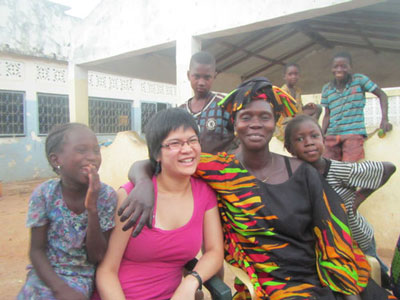 Through this internship, I have learned gained some valuable insight into project management and logistics. I have also experienced and appreciated a very different culture: the friendliness of “strangers” with whom one can chat any time, the openness and welcoming nature of everyone who wants to be your friend and receive your company, and the sharing nature between people. This experience has given me the opportunity to learn about myself as well: I didn’t expect that I would be able to pick up the local language as well as I did. It was challenging and discouraging at times, but having been able to learn Wolof and complete this internship has opened my eyes to the possibility of achieving what I set my mind to!
Through this internship, I have learned gained some valuable insight into project management and logistics. I have also experienced and appreciated a very different culture: the friendliness of “strangers” with whom one can chat any time, the openness and welcoming nature of everyone who wants to be your friend and receive your company, and the sharing nature between people. This experience has given me the opportunity to learn about myself as well: I didn’t expect that I would be able to pick up the local language as well as I did. It was challenging and discouraging at times, but having been able to learn Wolof and complete this internship has opened my eyes to the possibility of achieving what I set my mind to!
Sung Kyu Kim, Ecological Agriculture Intern 2013
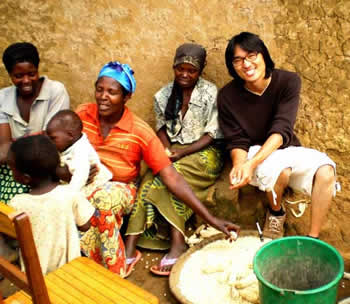 Born and raised in a small rural town in South Korea, I have always felt a deep connection and meaning from farming as a way of fulfilling life. Since moving to Montreal, Canada, I saw my world change profoundly but my childhood aspirations remained rooted to the cause of sustainable agriculture, natural farming and healthy, local food systems. I have combined diverse academic disciplines, from physical and social science to business, to better understand the important social and environmental issues of agroecology, rural development and food security.
Born and raised in a small rural town in South Korea, I have always felt a deep connection and meaning from farming as a way of fulfilling life. Since moving to Montreal, Canada, I saw my world change profoundly but my childhood aspirations remained rooted to the cause of sustainable agriculture, natural farming and healthy, local food systems. I have combined diverse academic disciplines, from physical and social science to business, to better understand the important social and environmental issues of agroecology, rural development and food security.
In 2010, I participated in an international nutrition and food security project in Rwanda where I gained first-hand experiences in conducting international development research. During the fieldwork, I also proposed and initiated a number of pilot projects to tackle rural food insecurity and improving local agriculture practices, including a locally designed & built compost tumbler machine.
I actively seek to engage and volunteer in my local and farming community. While living in Vancouver, I participated as an ambassador of the David Suzuki Foundation’s Green Your Workplace program and as a sustainability committee member of the Strathcona BIA. Moreover, my strong commitment to the local, sustainable food system has led me to explore and work in small-scale organic farming and artisanal cheesemaking in various regions in the B.C.
Education:
Masters in Food and Resource Economics, University of British Colombia
DESS in management and sustainable development, HEC Montréal
BSc. Environmental Geography, Concordia University
Host Country:
The Sénégal
Internship Experience:
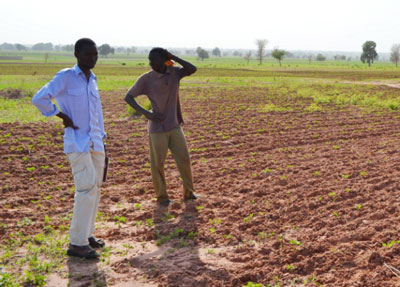 One of the main reasons why I joined this internship was to learn first-hand the challenging reality of ecological agriculture principles in international rural development context. The benefits of holistic farming have long been propounded in the industrialized world, but still many people (and the market) are in doubt of its feasibility and scalability to feed the growing global population.
One of the main reasons why I joined this internship was to learn first-hand the challenging reality of ecological agriculture principles in international rural development context. The benefits of holistic farming have long been propounded in the industrialized world, but still many people (and the market) are in doubt of its feasibility and scalability to feed the growing global population.
Being an avid promoter of sustainable food systems and a casual gardener, I wanted to see how ecological agriculture principles stand up against paramount constraints of rural Sub-Saharan Africa. Will the immediate concerns over food production and risks of crop failure impede local farmers’ decision to invest in slower responding ecological agriculture practices? If so, how can we help the local farmers to safely try the new methods without jeopardizing their immediate food and livelihood concerns? Lastly, will the newly learned practices “stick”, i.e., continually practiced by farmers even after our intervention and monitoring ends?
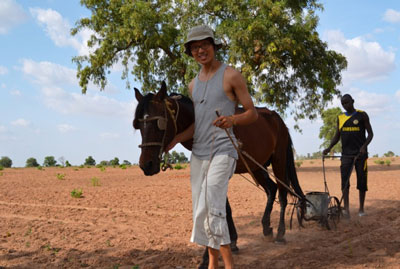 These three questions served as a guide and I always came back to them before, during and after every intention and action I thought it was worthy of sustainable local development. However, I quickly realized that many of our best-intended ideas and interventions would not pass the test. Why? Because we lacked 1) clear communication of project vision and incentives; 2) insurance and technical “holding-hands” to smoothen the transition; and most importantly 3) being there in person and train together in new practice until it becomes a working habit. All these take time! Of which, locals have abundantly and the interns very limited. So is this a loss battle and there is no hope for successful short-term internships? Not if you tap into something that can endure time and space: heartfelt friendship with host family, colleagues, and community members. That will stay even after you leave! If the project activities that we worked hard and tirelessly together can remain in collective memories of the beneficiaries, local colleagues and us (the Canadian partners), we can improve our chances of making an enduring and living contribution in local communities in West Africa…
These three questions served as a guide and I always came back to them before, during and after every intention and action I thought it was worthy of sustainable local development. However, I quickly realized that many of our best-intended ideas and interventions would not pass the test. Why? Because we lacked 1) clear communication of project vision and incentives; 2) insurance and technical “holding-hands” to smoothen the transition; and most importantly 3) being there in person and train together in new practice until it becomes a working habit. All these take time! Of which, locals have abundantly and the interns very limited. So is this a loss battle and there is no hope for successful short-term internships? Not if you tap into something that can endure time and space: heartfelt friendship with host family, colleagues, and community members. That will stay even after you leave! If the project activities that we worked hard and tirelessly together can remain in collective memories of the beneficiaries, local colleagues and us (the Canadian partners), we can improve our chances of making an enduring and living contribution in local communities in West Africa…
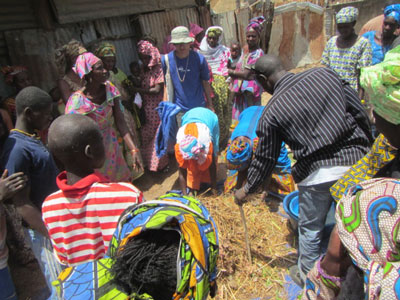 Now that I am back in much cooler and more forgiving environment, the inertia takes over and I become less and less Sénégalais de Saloum Saloum. Now, not forgetting to do my part, I call in and email to hear the village updates. This is perhaps one of the most difficult things to do: keeping in touch and working with them even after we move on to other things in life. It is our responsibility as international development professionals to continue to tell and share our collective stories. I often greet my Senegalese friends, colleagues, and family: Jappo! (Literally holding hand in hand – meaning we are together). I already look forward to return and have my hands (and heart) back into ecological farming practices. I know it works!
Now that I am back in much cooler and more forgiving environment, the inertia takes over and I become less and less Sénégalais de Saloum Saloum. Now, not forgetting to do my part, I call in and email to hear the village updates. This is perhaps one of the most difficult things to do: keeping in touch and working with them even after we move on to other things in life. It is our responsibility as international development professionals to continue to tell and share our collective stories. I often greet my Senegalese friends, colleagues, and family: Jappo! (Literally holding hand in hand – meaning we are together). I already look forward to return and have my hands (and heart) back into ecological farming practices. I know it works!
Pictures of our vegetable garden in Wack Ngouna: a full transformation within a month of time.
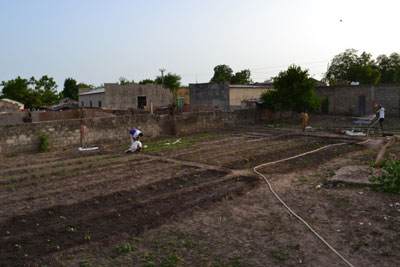
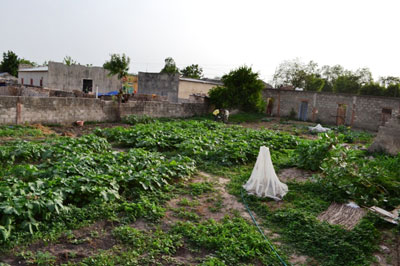
Hyla Nemy, Sustainable Agriculture Intern 2012-2013
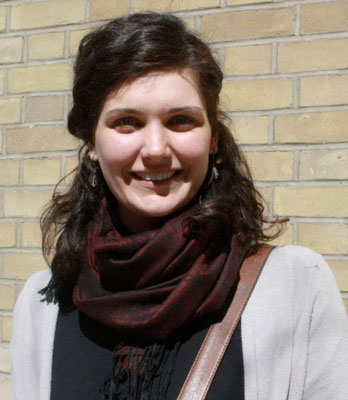 I am a young development professional interested in farming and food systems. Born and raised in Niagara, my career spans a diverse array of experience both in my own backyard and internationally. A common theme across my professional profile is an attraction to intercultural environments. I love the creativity and respect demanded by cross-cultural exchanges. I have five international areas of experience including studying at the University of Pune in India, working in the International Programs Office at Queen’s University, and running literacy programs with migrant labourers in Canadian agriculture. I traveled and volunteered for eight months in Asia, and am an enthusiatic student of French, Spanish, Arabic and (soon) Wolof.
I am a young development professional interested in farming and food systems. Born and raised in Niagara, my career spans a diverse array of experience both in my own backyard and internationally. A common theme across my professional profile is an attraction to intercultural environments. I love the creativity and respect demanded by cross-cultural exchanges. I have five international areas of experience including studying at the University of Pune in India, working in the International Programs Office at Queen’s University, and running literacy programs with migrant labourers in Canadian agriculture. I traveled and volunteered for eight months in Asia, and am an enthusiatic student of French, Spanish, Arabic and (soon) Wolof.
Agriculture – translated into food, fiber and fuel – is the primary lens through which billions of people engage in the development process. Working in agriculture has combined my professional and academic aspirations in international development with my love of the outdoors. Frontier College literacy programs were complemented by long hours of farm work alongside Mexican migrant labourers, at times without pause for months. I worked and lived on a subsistence farm in Jammu & Kashmir, prior to volunteering with the Ladakhi Women’s Alliance. My academic interests focus on rural development, food sovereignty and global agro-food systems.
I am looking forward to starting as an Agro-Ecological Farming Systems Intern with REAP Canada. I always aim to interpret challenges as learning opportunities, and I am certain that my time in the Gambia will be simultaneously educational and rewarding.
Education:
B.A.H. Global Development Studies, Queen’s University
Host Country:
The Gambia




